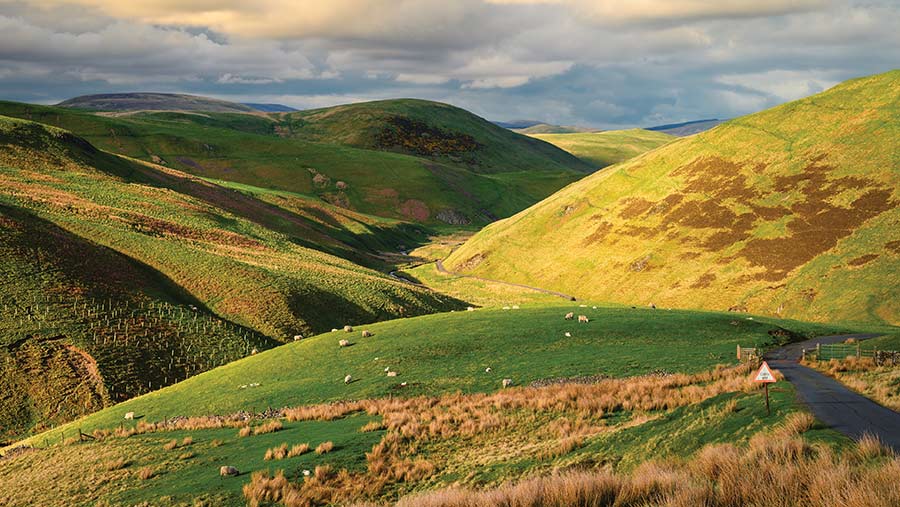NFU seeks £4bn budget for post-BPS era
 © iStockphoto.com/daverhead
© iStockphoto.com/daverhead A step increase in the agricultural budget for England to £4bn a year, including £720m of “stability” money, is essential if the government is to achieve its environmental, climate change and food production targets, says the NFU in its newly released manifesto.
The current government commitment is to maintain existing annual spending in England at £2.4bn for the life of this parliament.
But with a general election due next year – possibly as soon as May – politicians of all parties need to be thinking now about how they will fund their plans from 2025, says the NFU.
See also: NFU manifesto demands government targets for food production
To help in this, the NFU commissioned consultants Andersons to calculate how much would be needed to secure environmental delivery, productivity improvements and farm income stability.
Their modelling shows that, just for the environment, a budget of £2.7bn is required to meet the government’s own Environment Improvement Plan, plus the Climate Change Committee’s recommendations – including £1.1bn for habitat creation and species-friendly land management.
Productivity
Andersons also calculated that £615m will be needed each year to drive productivity – a sum that is based on current spending in seven other competing nations, including the US, New Zealand, Germany and France.
And to underpin financial stability for farmers, the NFU is seeking a further £720m – similar to the amount that will be paid out as delinked direct payments to farmers in England in 2024.
The NFU is quick to point out that it does not expect this money to take the form of a direct payment. “That ship has sailed,” said its deputy president Tom Bradshaw.
But the union is looking at various ways in which stability money could be allocated, including as top-ups to agri-environment payments or as a production-linked beef sustainability payment.
“We don’t want to get into a debate about how that money should be spent, but we must ensure that food production is no longer the poor relation in all this,” said Mr Bradshaw.
Response
The NFU’s manifesto, which includes a demand for statutory targets for food production, was presented to MPs in Westminster on Monday (11 December).
Robert Goodwill, who chairs the cross-party Environment, Food and Rural Affairs (Efra) committee, said it made a strong case for extra budget.
“If we are to deliver environmental goods, we need the funding behind it,” he said.
“Previously, the Basic Payment Scheme was just money in the bank, but under the new ELM scheme, farmers have got to do things, which either cost money or mean sacrificing output.”
Sir Robert added that both the Conservatives and Labour would be studying the books ahead of the election. “If anyone thinks a change of government will lead to more money in their pockets, they might be disappointed.”
But NFU policy director Andrew Clark insisted the £4bn funding demand was realistic. “We fully recognise that public budgets are going to be under pressure,” he said.
“But we’re talking here about funding that is going to be across the whole of the country, every constituency, delivering objectives the government has set out as statutory objectives.”
Liberal Democrat rural spokesman Tim Farron said he believed farming had been neglected for too long by the current government.
“It is high time ministers stepped up to the plate,” he said. “That means giving farmers the financial support they need, so they can protect our beautiful environment while producing wonderful food for generations to come.”
NFU Scotland asks for funding
A multi-annual funding commitment to support Scottish farmers and crofters to produce food and protect the environment tops the list of “key asks” for NFU Scotland (NFUS).
Westminster allocates £620m to the Scottish government for farming every year, but there is no guarantee this will continue in the next parliament.
NFUS policy director Jonnie Hall says Scottish farmers and crofters are required to do the “heavy lifting” around food production, climate mitigation and enhancing nature.
With a general election looming, Mr Hall said all political parties must commit to ringfenced multi-annual funding for the next parliament.
He argued that the Westminster government should increase its budget allocation to Scotland, which is about 17% of the total budget.
NFUS is calling on all political parties to include a manifesto pledge that would see the UK agricultural budget of about £3.7bn a year increase by at least £1bn for the term of the next parliament.
This would equate to an additional £170m a year for Scottish agriculture.
The union is also demanding the immediate reinstatement of £61m of agricultural funding allocated to the Scottish government by the UK Treasury, which has been “withdrawn”.
